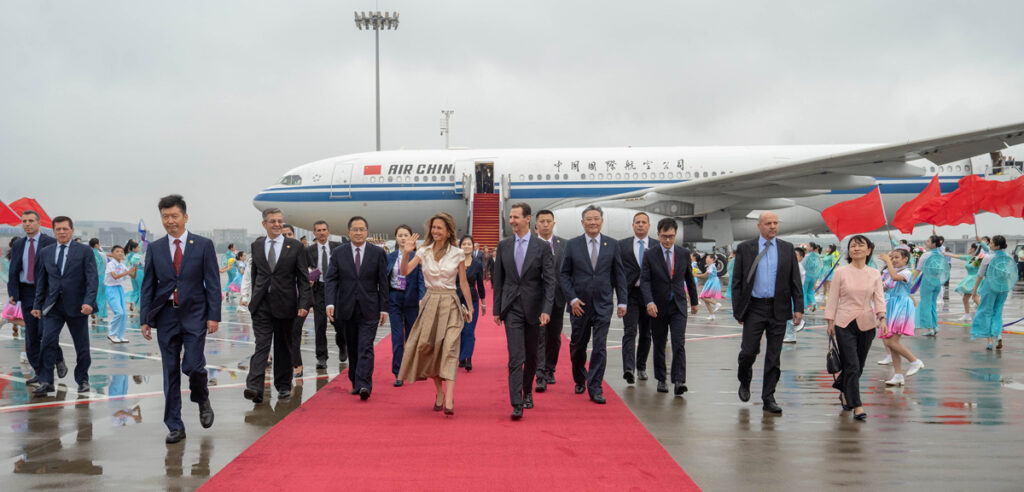Bashar Al-Assad, Syria’s president, landed in China yesterday (Sep. 21st), starting a formal several-day visit to the country. Senior Chinese officials welcomed the Syrian delegation after it had flown on a Chinese airline and landed in Hangzhou, eastern China. Assad and Xi Jinping, the Chinese president, will meet later today.

This visit is another step in China’s deepening involvement in the Middle East, pushed by Beijing’s aspirations to increase its influence throughout the world. At the same time, the visit presents an opportunity for Assad and Syria, which are in dire need of money.
As we mentioned in our special report on Chinese involvement in the Middle East, in recent years China has been increasing its economic influence throughout the world, and in the Middle East in particular.
This economic influence is meant to later strengthen Chinese political, diplomatic, and even military influence in the Middle East. By doing so, China wants to challenge the US’s status and influence in the region. This matter is prominent in the Middle East because of China’s dependency on Middle Eastern oil and gas. About 50% of the oil and gas imported by China comes from this region.
The Chinese aspiration to gain a foothold in Syria presents an opportunity for the Assad regime. The civil war left Syria in ruins, and despite its return to the Arab League and different attempts to get it closer to the moderate Sunni countries, it seems it is still politically isolated.
This situation, stemming from Western sanctions and Russian and Iranian involvement in the country, makes it very difficult to rebuild Syria.
In other words, Assad’s two main motivations for this visit are obtaining funds from the Chinese government and increasing the international legitimacy of his regime.
Contrary to the US and the West, it seems that China saw Assad’s distress and recognized the potential for increasing its influence in Syria. This led to Chinese-Syrian rapprochement in recent years. This was expressed in a series of Chinese gestures, such as food shipments, humanitarian aid, Corona vaccines, and more. The peak of this trend was the signing, in 2022, of a series of agreements to make Syria a part of the “Belt and Road” imitative.
Apart from economic and trade fields, these agreements include military aspects, the rebuilding of infrastructure, and more, and it seems they express both sides’ common interests.
While China gets to increase its influence in the region, Assad might get a new source for investments as well as open up additional options for rebuilding the country’s infrastructure and economy.
An increasing Chinese influence in the region might also have a future impact on the American presence in the Middle East in general and in Syria in particular. This is especially important in light of Iran’s extensive involvement in Syria and Syria, Iran, China, and Russia’s shared desire to drive the US out of the region.
One possible scenario is the creation of an economic mechanism to bypass Western sanctions within the framework of which China, Iran, and Syria will cooperate.
A similar mechanism already exists today with the example of the economic relations between Iran and China, which are conducted partially via an exchange of oil for products.
Expanding this mechanism to also include Syria could eliminate many of the sanctions imposed on Syria, weakening the levers in the hands of the US and damaging its ability to promote its interests and policies.
Such developments can certainly affect Israel as well.







One Response
At this point, Syria has nothing to trade for China’s aid. The U.S. controls what little oil Syria has. That’s why Syria became so heavily involved in the captagon trade; it has no assets.
So, Syria becomes China’s vassal.
This may be enough to move the US to act more effectively.
Preventing China from capitalizing on weakness appears a strong motivation for the U.S. NSC advisor, Jake Sullivan, who appears to dominate US foreign policy-making. This motivation – denying an opportunity for China – appears key to US rejoining UNESCO & doing a 180 on Saudi policy, energetically working since at least 4/23 to make an internally difficult deal to give KSA strong mil & even nuclear development support in the face of strong domestic opposition.